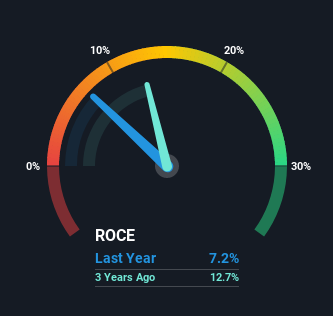Here's What To Make Of Famur's (WSE:FMF) Decelerating Rates Of Return
What are the early trends we should look for to identify a stock that could multiply in value over the long term? Ideally, a business will show two trends; firstly a growing return on capital employed (ROCE) and secondly, an increasing amount of capital employed. This shows us that it's a compounding machine, able to continually reinvest its earnings back into the business and generate higher returns. In light of that, when we looked at Famur (WSE:FMF) and its ROCE trend, we weren't exactly thrilled.
Return On Capital Employed (ROCE): What is it?
For those who don't know, ROCE is a measure of a company's yearly pre-tax profit (its return), relative to the capital employed in the business. The formula for this calculation on Famur is:
Return on Capital Employed = Earnings Before Interest and Tax (EBIT) ÷ (Total Assets - Current Liabilities)
0.072 = zł154m ÷ (zł2.7b - zł521m) (Based on the trailing twelve months to September 2021).
Therefore, Famur has an ROCE of 7.2%. In absolute terms, that's a low return but it's around the Machinery industry average of 8.0%.
See our latest analysis for Famur

In the above chart we have measured Famur's prior ROCE against its prior performance, but the future is arguably more important. If you'd like to see what analysts are forecasting going forward, you should check out our free report for Famur.
What Does the ROCE Trend For Famur Tell Us?
There are better returns on capital out there than what we're seeing at Famur. The company has employed 88% more capital in the last five years, and the returns on that capital have remained stable at 7.2%. Given the company has increased the amount of capital employed, it appears the investments that have been made simply don't provide a high return on capital.
One more thing to note, even though ROCE has remained relatively flat over the last five years, the reduction in current liabilities to 20% of total assets, is good to see from a business owner's perspective. Effectively suppliers now fund less of the business, which can lower some elements of risk.
What We Can Learn From Famur's ROCE
As we've seen above, Famur's returns on capital haven't increased but it is reinvesting in the business. And in the last five years, the stock has given away 23% so the market doesn't look too hopeful on these trends strengthening any time soon. All in all, the inherent trends aren't typical of multi-baggers, so if that's what you're after, we think you might have more luck elsewhere.
Since virtually every company faces some risks, it's worth knowing what they are, and we've spotted 2 warning signs for Famur (of which 1 doesn't sit too well with us!) that you should know about.
If you want to search for solid companies with great earnings, check out this free list of companies with good balance sheets and impressive returns on equity.
New: Manage All Your Stock Portfolios in One Place
We've created the ultimate portfolio companion for stock investors, and it's free.
• Connect an unlimited number of Portfolios and see your total in one currency
• Be alerted to new Warning Signs or Risks via email or mobile
• Track the Fair Value of your stocks
Have feedback on this article? Concerned about the content? Get in touch with us directly. Alternatively, email editorial-team (at) simplywallst.com.
This article by Simply Wall St is general in nature. We provide commentary based on historical data and analyst forecasts only using an unbiased methodology and our articles are not intended to be financial advice. It does not constitute a recommendation to buy or sell any stock, and does not take account of your objectives, or your financial situation. We aim to bring you long-term focused analysis driven by fundamental data. Note that our analysis may not factor in the latest price-sensitive company announcements or qualitative material. Simply Wall St has no position in any stocks mentioned.
About WSE:GEA
Grenevia
Manufactures and sells machinery and equipment for mining, transport, and power industries worldwide.
Flawless balance sheet and good value.
Similar Companies
Market Insights
Community Narratives




